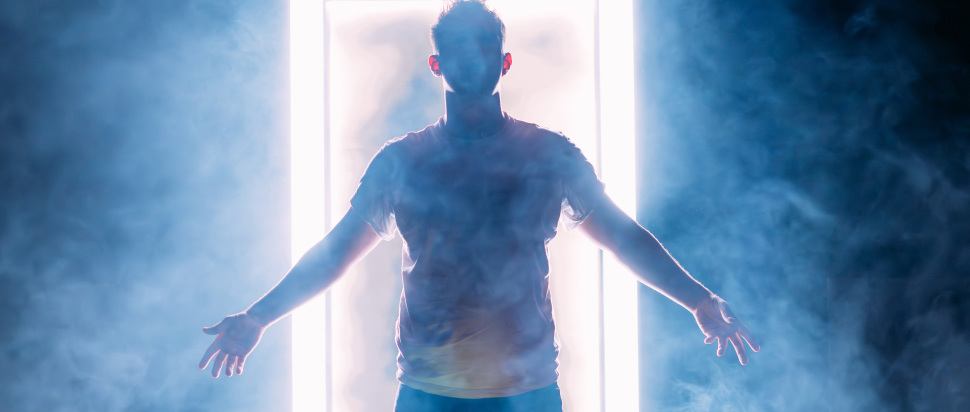The Digital Depths: Owen Sutcliffe on his debut play Òran
Owen Sutcliffe discusses his visceral debut play, Òran, and the ways in which young men find and lose each other in an online world
When Owen Sutcliffe pictures the underworld, he sees a black mirror.
The 31-year-old playwright’s first show, Òran, is enjoying its first UK tour after an award-winning run at the 2024 Edinburgh Fringe. Directed by Jack Nurse with lyrical storytelling and a live electronic score, the modern retelling of the myth of Orpheus follows Òran on an odyssey to rescue his best friend from an underworld of social media and pubescent shame.
Sutcliffe – also an emcee, forest school leader and youth worker – says the inspiration to write Òran came about from his work with young people navigating this digital abyss. “[Òran] is about the pain of young people growing up in this modern age,” he says. “It’s about my own experiences as a wee guy… but being around this stuff in my work, the underworld is this terrible place that is stoked by the insidious nature of social media.”
Through Òran’s journey, Sutcliffe illustrates the emotional toll social media takes on today’s youth. They have “whole languages,” he explains, that adults don’t speak. Emojis, memes and online personas reflect a youth culture practically password-protected from older folks. So, who can they turn to when trapped behind the screen? Sutcliffe’s answer is tender: their friends.
Òran is a play about platonic love, especially among boys and men. And although Sutcliffe didn’t intend to write about masculinity, it becomes an inevitable theme, as the depiction of young Òran risking it all for his best pal is subversive against the backdrop of male friendships so often shown without consequence.
Sutcliffe says his own experience growing up in a home where emotional expression was encouraged deeply shaped this portrayal. “I didn’t set out to comment on masculinity, but I'm a man, and I’ve written about a boy, so I have,” he says. “I work with young people for whom the definition of masculinity is quite narrow. It’s difficult sometimes – I’m maybe a different sort of man than they’re used to, and sometimes they can be triggered in an inexplicable way by my version of a man.”
The play also touches on the shame and confusion boys experience as they grow up, especially in the age of social media. The pressures of adolescence – exacerbated by online culture – are central to Òran, and Sutcliffe emphasizes that platonic love can be an antidote. “I feel it is so important for men to tell each other that they love each other; to not only show it, but to take time to reflect for themselves about their male friendships,” he says. “I love my pals.”
One of Òran’s most distinctive features is its immersive soundscape by Glasgow duo VanIves. Sutcliffe, a lover of hip-hop and rhythm-based music, chose to tell the story through rhyme and Robbie Gordon, the sole performer on stage, plays a crucial role in building this soundscape. As he manipulates his musical equipment live, looping sounds and creating layers of music, he enhances the emotional weight of the story. “It’s a gargantuan effort,” Sutcliffe says. “The more he’s doing on stage, the more of a tour-de-force he is to watch.”
Sonically, the composers have created a soundscape that “does not let up,” he says, noting the way the score shifts and distorts as Òran heads to Hades. The show begins in the real world, with acoustic music holding audiences in a palatable calm – until it begins to fracture. As Òran goes deeper, industrial and electronic sounds disturb the clarity of life on Earth, and viewers are swept into chaos. It’s a sonic journey that Sutcliffe calls “just as important as the text.”
He remembers last summer at the Fringe, when his debut play was finally up and running, and he made his first whole-hearted descent into Òran’s story with an audience. “In that sweatbox [Pleasance Courtyard's Baby Grand] last summer at the Fringe, we were piled on top of each other, pissing sweat, and the whole thing was cranking up in temperature as you went to hell,” he says. “It was hectic in a beautiful way.”
On the back of such evocative performances, Sutcliffe hopes that audiences leave Òran thinking about their relationships. “I hope audiences leave thinking about their friends. I hope parents will leave thinking about their children,” he says. “I hope people leave thinking about the way they use their phones… but we’re all so stuck in the tide, it’s difficult to extract yourself from that world.
“I hope young people feel like it is for them, and about them, but not talking down to them… I hope it feels true and real and shocking, in a way that feels theirs. I hope it feels like it belongs to them.”
Òran tours Scotland until 15 Nov, including Citizens Theatre, Glasgow, 29 Oct-1 Nov; Eastwood Park Theatre, Giffnock, 4 Nov; Traverse Theatre, Edinburgh, 13-15 Nov
